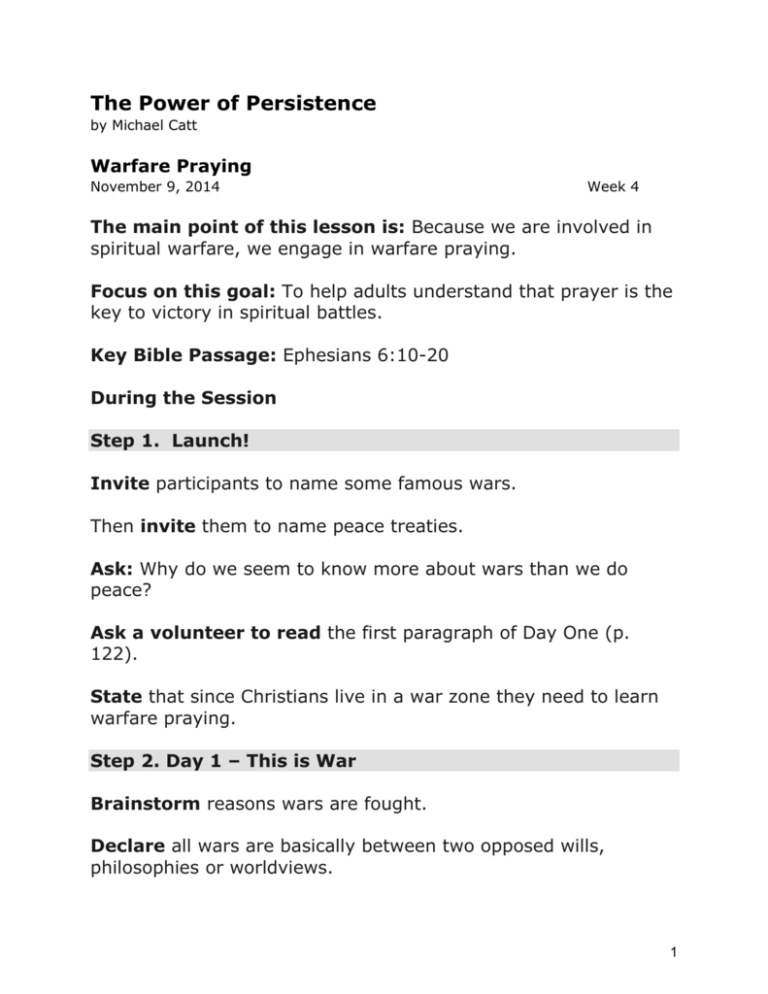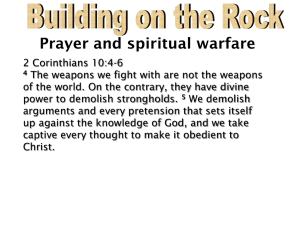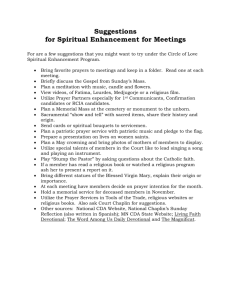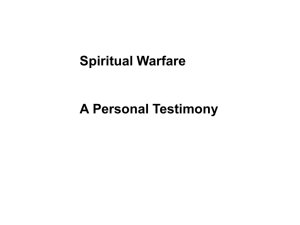Love as a Way of Life
advertisement

The Power of Persistence by Michael Catt Warfare Praying November 9, 2014 Week 4 The main point of this lesson is: Because we are involved in spiritual warfare, we engage in warfare praying. Focus on this goal: To help adults understand that prayer is the key to victory in spiritual battles. Key Bible Passage: Ephesians 6:10-20 During the Session Step 1. Launch! Invite participants to name some famous wars. Then invite them to name peace treaties. Ask: Why do we seem to know more about wars than we do peace? Ask a volunteer to read the first paragraph of Day One (p. 122). State that since Christians live in a war zone they need to learn warfare praying. Step 2. Day 1 – This is War Brainstorm reasons wars are fought. Declare all wars are basically between two opposed wills, philosophies or worldviews. 1 Determine the two opposing wills in this epic spiritual war. (God and Satan) Ask who Satan attacks in an effort to defeat God. State: Since Christians are God’s army, we need to fight with God’s armor. Discuss Day One activity 1 (p. 122). Write Adversary, Assignment and Armor on a large writing surface, leaving room after Armor to record the pieces later in the session. Ask: Can you win a war if you don’t know your adversary? Why? Invite someone to read 2 Corinthians 2:11. Brainstorm schemes Satan uses against Christians, using John 8:44 and Revelation 12:10 to add to the discussion. Ask: If Christians are aware of Satan’s schemes why do we fall for them? Declare one reason is we are not fulfilling our assignment. Challenge participants to identify the number of times “stand” occurs in Ephesians 6:10-19. Ask: Do you think our assignment is to stand or to pray, or are they interrelated? Explain your reasoning. Step 3. Day 2 – The Winning Hand Ask learners if they agree with the first sentence of Day Two (p. 123) and why. Consider reasons believers don’t pray as if they are fighting a 2 battle. State one reason is a lack of faith in God’s promises. Discuss Day Two activity 1 (p. 124). Consider why times of victory might be the times Christians really need to engage in warfare praying. Ask: Should we be encouraged or discouraged when we, our family or church are attacked by Satan? Why? Request a volunteer read Revelation 12:12. Examine how believers’ prayers can reflect that Satan is a desperate, dangerous, yet defeated Enemy. Step 4. Day 3 – Prepare for Prayer Ask: If our Enemy is defeated, why has the church so often “resigned ourselves to defeat as the norm”? Read the first three bullet points in Day Three (pp. 125-126). Evaluate how believers would respond differently to the political, pop-cultural and religious environments if they focused on fighting their true Enemy. Read the fourth bullet point (p. 126). Request learners identify from Ephesians 6:10-18 the spiritual armor believers have been given. List them under Armor on the board. Ask: How do we treat this armor casually? How do we treat prayer casually? 3 How can we take spiritual things more seriously? Analyze how the kind of prayer Paul promoted in Ephesians 6:18-19 differs from the average prayer. Read the fifth bullet point (p. 126). Discuss Day Three activity 1 (p. 126). Guide the group to analyze what might happen if believers accepted Catt’s challenge to pray for a week without praying for anything personal. Step 5. Day 4 – Fully Armored Explain Paul most likely drew inspiration for his description of spiritual armor in Ephesians 6 from the Roman soldier guarding him. He also could have been thinking of Isaiah 59:14-21. Discuss Day Four activity 1 (p. 127). Evaluate how prayer intervenes when justice, righteousness and truth are lacking. Ask what believers can know about their armor since it’s the armor God wears and supplies. Complete Day Four activity 2 (p. 128). Ask what kinds of thoughts believers need to take captive. Refer back to the pieces of armor listed on the board and examine how each can help believers take every thought captive. Step 6. Day 5 – Closing in Prayer Consider weapons the world uses to fight its battles. 4 Identify the offensive weapons believers have to fight in spiritual warfare. Discuss the quotes in the margin of Day Five (p. 129). Analyze why God’s Word is so powerful against Satan. Remind learners from John 8:44 that there is no truth in Satan, consequently he cannot stand truth nor can he stand against truth. Encourage participants to recall what Jesus did when tempted by Satan (see Matt. 4:1-11). Invite volunteers to share how they have used Scripture as a weapon against Satan. Invite volunteers to share how praying Scripture to God gives them a sense of peace and power in their prayers. Step 7. Wrap-up Guide the group to explore the spirit of prayer that is prevalent in a prayer warrior. Ask: Is that kind of prayer just for spiritual giants or for people like us? How can we get that kind of spirit? State one way is by daily putting on spiritual armor. Urge learners to follow the Day Five activity 1 (p. 130) suggestion every day this week. Close in prayer. 5








